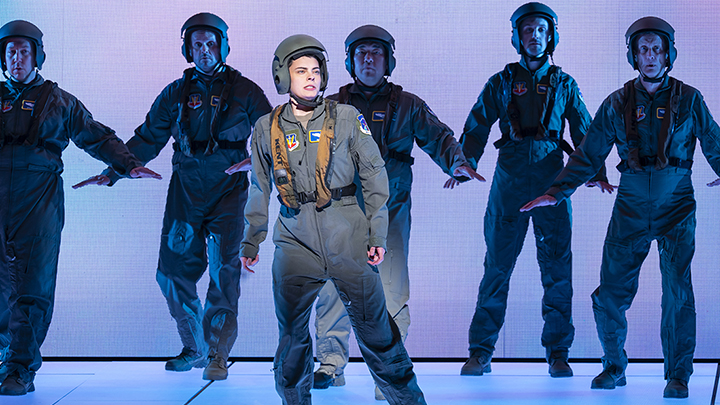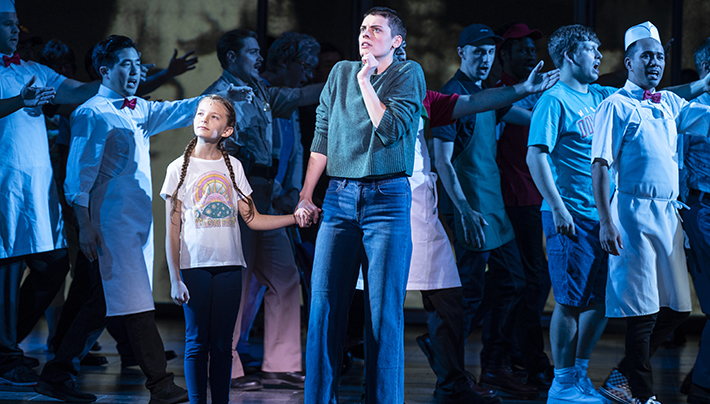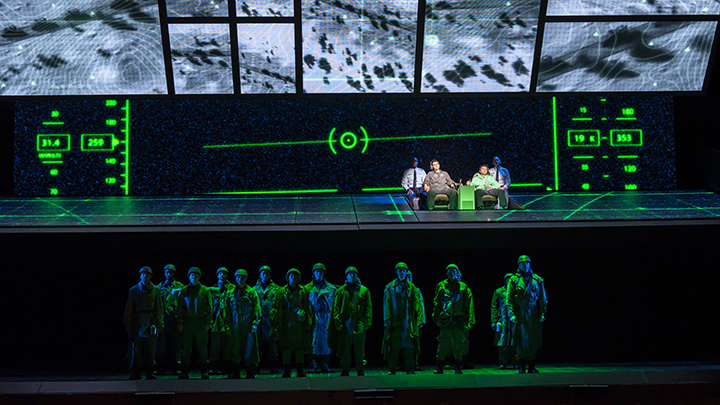
Washington National Opera presented the world premiere of “Grounded” Saturday night, a Met co-production and the second opera featuring music by Jeanine Tesori to appear at the Kennedy Center this year after last season’s uneven Blue. Unfortunately, much like Blue, an engaging Tesori score and capable cast couldn’t quite redeem a wanting libretto in this new work on the effects of modern warfare.
Adapted by playwright George Brant from his widely produced one-woman show, Grounded follows a hard-charging fighter pilot (Jess) who is sidelined by an unexpected child. Relegated to the strange world of drone pilots when she returns to the Air Force eight years later, she struggles to reconcile her domestic life with the stress of her grim day job.
The challenges of expanding this monologue for a single actor into a traditional opera with a multi-person cast are immediately evident in Act I, which laboriously creates new scenes to build out each beat of the plot without developing these interactions as meaningful instances of conflict or tension. Chopping up the action and dutifully showing each plot point may work in a film but in an opera, where every piece of marginal dialogue must be set to music, it feels like a chore.
Scenes like the initial one-night stand between Jess and future husband Eric are plagued by mundane small talk and arias heavy on extraneous characterization. At the same time, scenes which could carry real weight, for instance, Jess showing up pregnant on Eric’s doorstep, feel inconsequential, the brief exchange of trivial dialogue on stage not commensurate with the roiling orchestra beneath.
Too often the score and libretto seem to be scrambling to fill time, as in the extended recitation of technical details about the Reaper drone in the Trainer’s aria, or Eric narrating keyboard strokes at his laptop. The ploddingly linear unfolding of the libretto also means that Act I invests too much time in illustrating what are ultimately pieces of context for the actual story, like Jess’s disappointment at having to fly a drone and her resignation to family life.
Finally, towards the end of Act I’s nearly 90-minute run time, the piece’s central conflict of Jess’s unraveling under the psychological stress of her job as a drone operator comes clearly into view, and Act II feels more focused. In the climax (spoilers ahead), Jess suffers a psychological break when commanded to kill a long-sought after target with his child, because she hallucinates that the child is her own daughter, leading to her imprisonment in a military jail. The bleak ending and denouement are some of the most effective parts of the show, but they feel unearned, like the ending to a different, more focused work.
Director Michael Mayer is tasked with achieving a delicate tonal balance in Grounded. The opera’s military material goes all in with a caustic Strangelovian tone, replete with characters like a drone operations trainer who takes fetishistic pleasure in the machine’s capabilities, or the sinister offstage voices of the officials of “Kill Chain” that confirm Jess’s targets. Meanwhile, the domestic drama is written and played as earnestly as a Lifetime movie. While these halves are clearly meant to contrast, the disconnect is so stark that they can feel like they are working at different purposes, rather than as different halves of a coherent whole. A willingness to play for easy chuckles, often on the old crutch of singing something silly or profane with an opera voice (see Act II’s opening mall sequence) also undercuts the attempt at dark satire.
Tesori’s expansive score for Grounded offers plenty to appreciate in how it approaches the opera’s varied settings, from overwrought military fanfares to ardent lyricism for Eric and Jess’ love story, and anxious tension for the drone sequences. The vocal writing for Jess’s character offers a number of musically compelling statements, from her paean to flight to her disturbing declarations of wanting to destroy the enemies, a “Hojotoho” for the remote warfighter. Choruses for the soldiers and the ensembles for the disembodied voices of the “Kill Chain” are all especially fine.
Tesori allows a bit more of the sentimentality familiar from her Broadway scores here than she did in her score for Blue, as in the recurring song for Jess’s daughter and the heartrending accompaniment to the climax. While rarely dull, the bounty of musical invention can also be a drawback, as the music seems focused on effectively realizing discrete scenes instead of considering larger musical arcs that might help to bring more coherence to the piece.
Mezzo-soprano Emily D’Angelo is terrific in the central role, where she both clearly communicates Jess’s personality in recitative-like commentary passages and ably tackles the role’s demanding arias. Joseph Dennis’s Eric gets some of the most memorable solo passages of the evening, particularly a piece late in Act II on Jess’ plight that perfectly suited his clear, supple tenor. In the role of “Other Jess,” an embodiment of Jess’s declining psychological state, Teresa Perrotta’s penetrating soprano married well with D’Angelo’s sound in close duets, though as a dramatic device the part felt underused.
Morris Robinson’s menacing bass made the most of the Commander character that Jess interacts with for her assignments. Further filling out the roster of military characters, Frederick Ballentine’s razor-edged tenor leaned into the ugly exuberance of the drone trainer’s monologue, and Kyle Miller had a funny turn as the inevitable teenage gamer turned drone operator who works with Jess.
Conductor Daniela Candillari led a detailed and persuasive rendition of Tesori’s score from the Washington National Opera House Orchestra, the orchestras strings and winds sounding lush in the sweeping romantic passages, while the Washington National Opera Chorus members excelled in the soldier’s choruses.
While fully substituting LED screens for traditional sets has a decidedly mixed track record in opera productions, the iteration in Grounded has happily learned some lessons from the past, with projections (by Kaitlyn Pietras and Jason H. Thompson) that thoughtfully evoke different settings without drawing too much attention to themselves or providing excessive competition for the analog happenings on stage. Another key is that the physical production, with sets by Mimi Lien and lighting by Kevin Adams doesn’t rely on the LED screens to do everything, providing traditional physical sets at the bottom of the stage for domestic spaces like bars and living rooms.
Grounded is headed to New York next year, continuing the Met’s laudable focus on contemporary and new works. Yet on the evidence of this try-out, it may be destined to share in the dramatic pitfalls that seem to bedevil so many of the new works attempting to develop large scale stories for the operatic stage.
Photos: Scott Suchman




























Comments